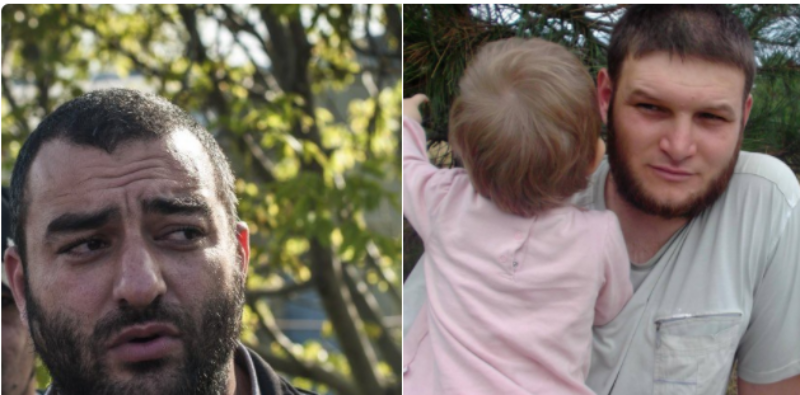• Topics / Human Rights Abuses in Russian-occupied Crimea
Armed searches & jail for deleted reposts to silence protest in Russian-occupied Crimea

Another Crimean Tatar has seen his family subjected to a frightening search by armed and masked men, and himself been interrogated, with the reason clearly linked with his civic position. A Crimean court under Russian occupation has meanwhile found nothing unlawful about another civic activist’s jailing over a 7-year-old post on a long-deleted social network page.
Russian FSB officers arrived at the Simferopol home of Tofik Abdulgaziev early in the morning of May 4. Lawyer Edem Semedlyaev says that they claimed the search was linked with criminal proceedings over the disappearance of a Crimean Tatar Enver Memetov. The FSB assert that the latter went to Syria in June 2016, and that the search was needed because Abdulgaziev might have known him. As might many other people who do not demonstrate Abdulgaziev’s clear civic position. The FSB were at least polite and left, having examined computer, telephones, etc. but found nothing. Around 20 minutes later, Abdulgaziev received a telephone call summoning him for questioning to the so-called centre for countering extremism. He went together with Semedlyaev and rejected their attempt to take his fingerprints. He and Semedlyaev also refused to answer any questions as it was quite unclear what any of this was over. For the moment, this is how the FSB measures ended.
Abdulgaziev reports that the FSB hinted at the real reason for their visitation. They said that if he continued taking videos (of searches, etc.), they would be talking in a different way the next time. He understandably interprets this as a warning of what to expect if he continues to report on things happening in Crimea.
There are ample grounds for believing this to be the real motive. News of the latest search and / or arrest spreads swiftly in occupied Crimea and neighbours and friends have come out onto the street in a sign of solidarity, often expressing indignation at the repressive measures being applied. Initial administrative fines have proven ineffective, and since early this year totally peaceful observers have themselves been detained and even jailed. There are clear attempts to target those Crimean Tatars who most actively report and video the proceedings.
After the first such mass detention on Feb 21, 11 people were jailed, one over an old post on a social network page and the other ten merely for having stood on the street and / or streamed the proceedings on the Internet. Russian TV, however, presented an entirely different version of events, embellishing it with fake video footage.
One of those jailed for reporting on the detention was Remzi Bekirov, a 30-year-old father of three. He served the 5-day sentence, imposed without a lawyer present, and was a month later, on March 30, called into the ‘centre for countering extremism’, supposedly to collect the tablet which had been taken from him.
He was there detained, and presented with a new administrative charge - ‘circulating extremist material’ under Article 20.29 of the Code of Administrative Offences. The supposed extremist content was a reposted video clip about the ‘Prymorsky Partisans’, a vigilante group that targeted police officers whom they accused of brutality and corruption. The repost itself was seven years old and therefore far pre-dated Russia’s invasion and annexation of Crimea. It had moreover been on a VKontakte page which Bekirov deleted earlier this year.
Bekirov remained in the Centre, and was then taken to the Russian-controlled Simferopol District Court. Typically, all places in the courtroom had been filled by court employees to prevent the many people coming to show support for Bekirov from attending. The ‘case’ was presented by Ruslan Shambazov, a senior officer at the ‘centre for countering extremism’ and involved in other highly dubious actions. Shambazov falsely claimed that Bekirov had gone onto that page a week earlier, although provided no evidence to back this. Bekirov was jailed for a further 3 days over a deleted repost from 2009 which could not conceivably have fallen under Russian jurisdiction.
Bekirov lodged an appeal, together with lawyer Elvina Semedlyaeva who argued that even if there had been an infringement of the law, this had ceased to be the case when the post was deleted.
At the appeal hearing, Shambazov claimed that the post had been discovered in February, although the protocol was drawn up only at the end of March. While judges under Russian occupation can be relied on to rubber-stamp just about anything, the acknowledgement of such a flagrant breach of procedure was strange. It may indicate that the FSB preferred not to admit that they have access to deactivated pages. It should be noted that all cases involving posts or reposts have been linked with the Russian-based social network VKontakte, which clearly cooperates closely with the FSB.
The Russian-controlled Crimean High Court ignored all the absurdities of the case and upheld the original sentence.
Bekirov himself called the measures against him a message to all Crimean Tatars “that they should be frightened, not come out, not be active”. The unwarranted search of Tofik Abdulgaziev’s home and intimidation of his wife and small children are another such brutal warning.





